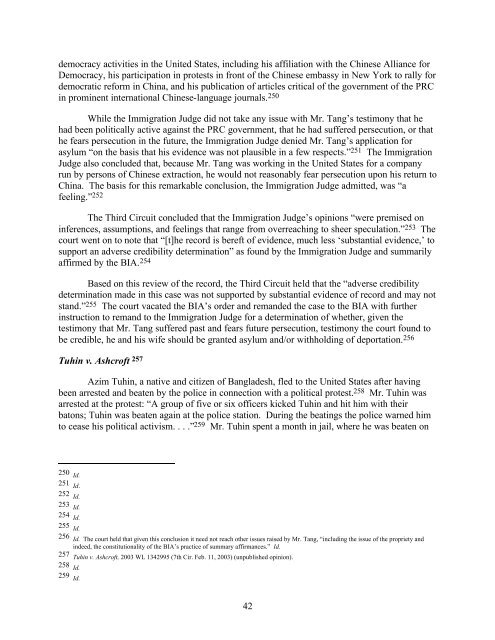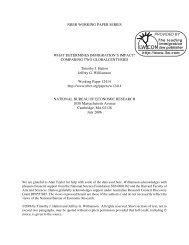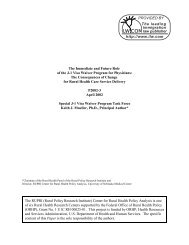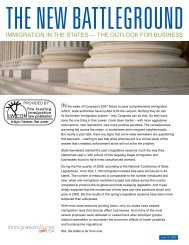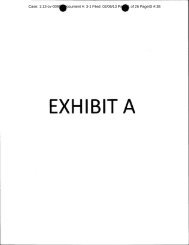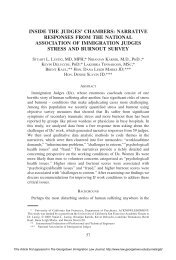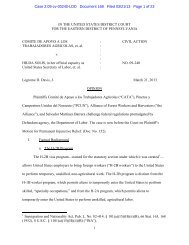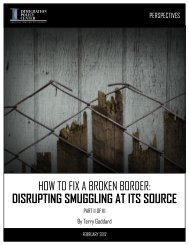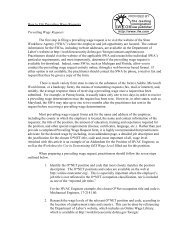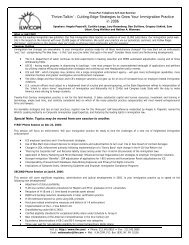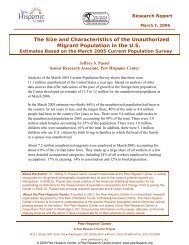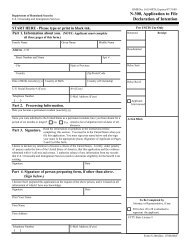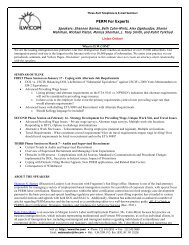Study of Board of Immigration Appeals Procedural Reforms - ILW.com
Study of Board of Immigration Appeals Procedural Reforms - ILW.com
Study of Board of Immigration Appeals Procedural Reforms - ILW.com
You also want an ePaper? Increase the reach of your titles
YUMPU automatically turns print PDFs into web optimized ePapers that Google loves.
democracy activities in the United States, including his affiliation with the Chinese Alliance for<br />
Democracy, his participation in protests in front <strong>of</strong> the Chinese embassy in New York to rally for<br />
democratic reform in China, and his publication <strong>of</strong> articles critical <strong>of</strong> the government <strong>of</strong> the PRC<br />
in prominent international Chinese-language journals. 250<br />
While the <strong>Immigration</strong> Judge did not take any issue with Mr. Tang’s testimony that he<br />
had been politically active against the PRC government, that he had suffered persecution, or that<br />
he fears persecution in the future, the <strong>Immigration</strong> Judge denied Mr. Tang’s application for<br />
asylum “on the basis that his evidence was not plausible in a few respects.” 251 The <strong>Immigration</strong><br />
Judge also concluded that, because Mr. Tang was working in the United States for a <strong>com</strong>pany<br />
run by persons <strong>of</strong> Chinese extraction, he would not reasonably fear persecution upon his return to<br />
China. The basis for this remarkable conclusion, the <strong>Immigration</strong> Judge admitted, was “a<br />
feeling.” 252<br />
The Third Circuit concluded that the <strong>Immigration</strong> Judge’s opinions “were premised on<br />
inferences, assumptions, and feelings that range from overreaching to sheer speculation.” 253 The<br />
court went on to note that “[t]he record is bereft <strong>of</strong> evidence, much less ‘substantial evidence,’ to<br />
support an adverse credibility determination” as found by the <strong>Immigration</strong> Judge and summarily<br />
affirmed by the BIA. 254<br />
Based on this review <strong>of</strong> the record, the Third Circuit held that the “adverse credibility<br />
determination made in this case was not supported by substantial evidence <strong>of</strong> record and may not<br />
stand.” 255 The court vacated the BIA’s order and remanded the case to the BIA with further<br />
instruction to remand to the <strong>Immigration</strong> Judge for a determination <strong>of</strong> whether, given the<br />
testimony that Mr. Tang suffered past and fears future persecution, testimony the court found to<br />
be credible, he and his wife should be granted asylum and/or withholding <strong>of</strong> deportation. 256<br />
Tuhin v. Ashcr<strong>of</strong>t 257<br />
Azim Tuhin, a native and citizen <strong>of</strong> Bangladesh, fled to the United States after having<br />
been arrested and beaten by the police in connection with a political protest. 258 Mr. Tuhin was<br />
arrested at the protest: “A group <strong>of</strong> five or six <strong>of</strong>ficers kicked Tuhin and hit him with their<br />
batons; Tuhin was beaten again at the police station. During the beatings the police warned him<br />
to cease his political activism. . . .” 259 Mr. Tuhin spent a month in jail, where he was beaten on<br />
250 Id.<br />
251 Id.<br />
252 Id.<br />
253 Id.<br />
254 Id.<br />
255 Id.<br />
256 Id. The court held that given this conclusion it need not reach other issues raised by Mr. Tang, “including the issue <strong>of</strong> the propriety and<br />
indeed, the constitutionality <strong>of</strong> the BIA’s practice <strong>of</strong> summary affirmances.” Id.<br />
257 Tuhin v. Ashcr<strong>of</strong>t, 2003 WL 1342995 (7th Cir. Feb. 11, 2003) (unpublished opinion).<br />
258 Id.<br />
259 Id.<br />
42


